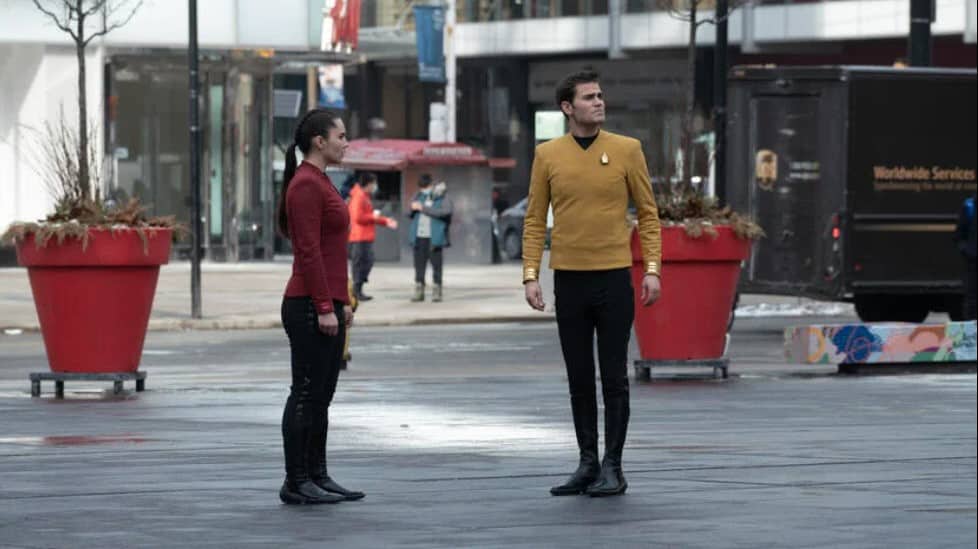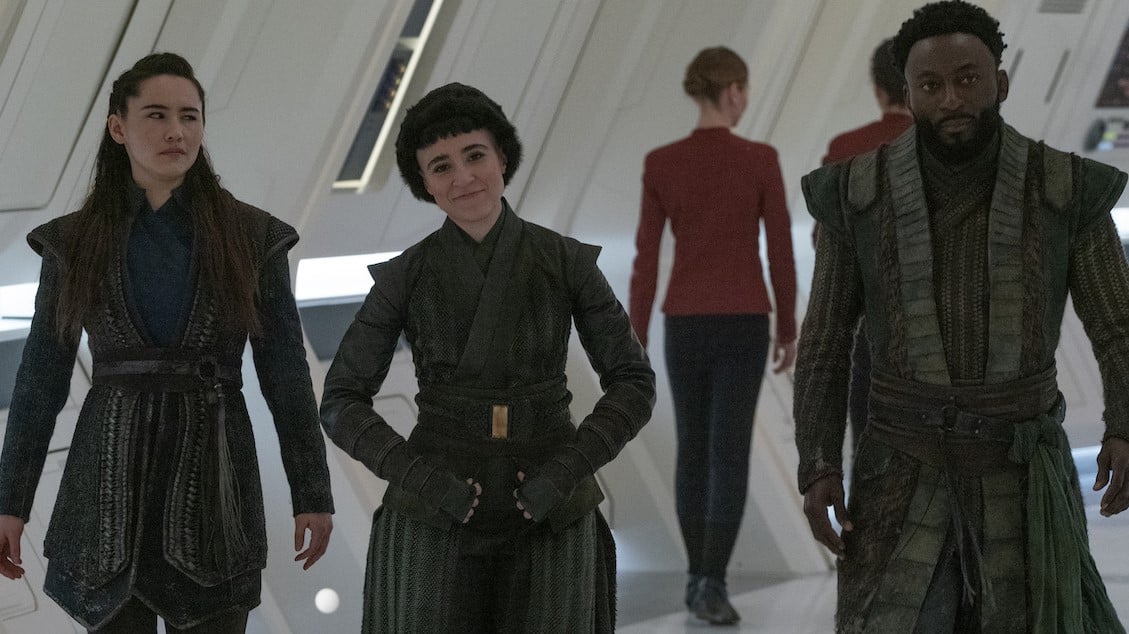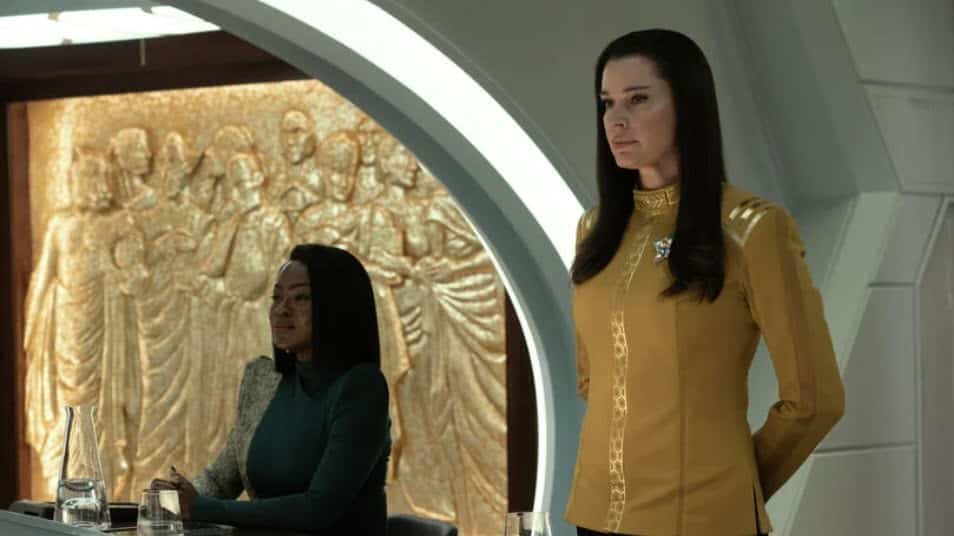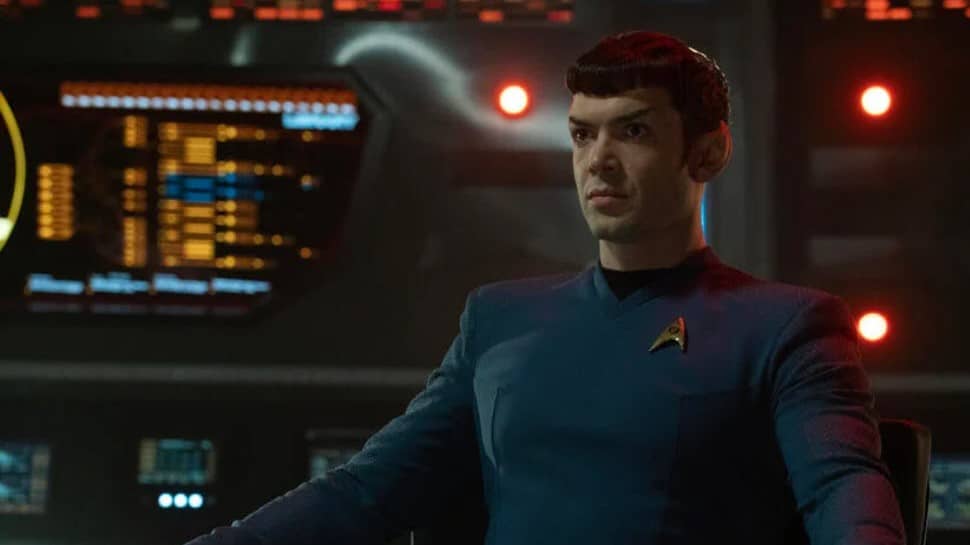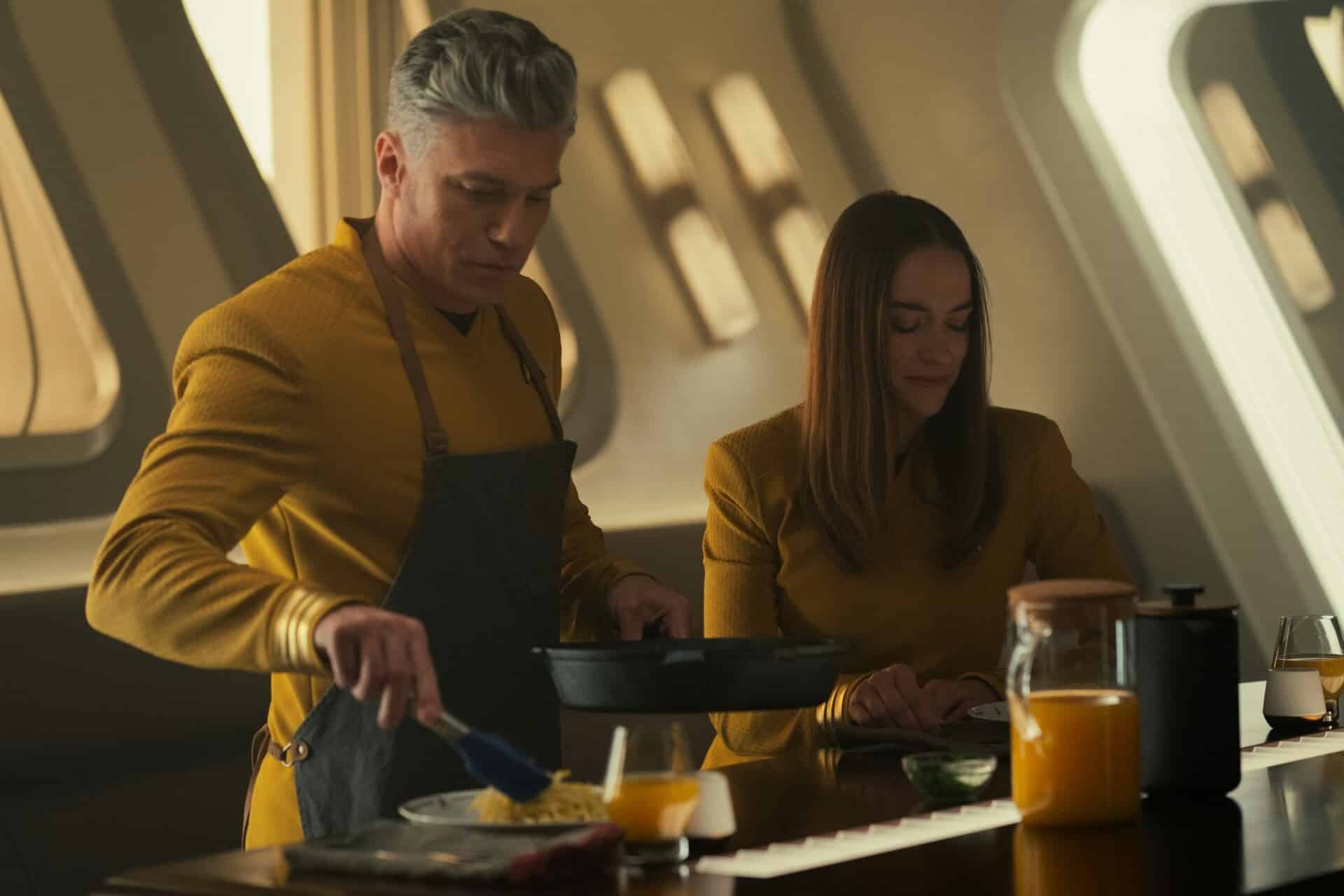La’an gets sucked into a time travel adventure with an unfamiliar Captain Kirk. With the future of the Earth at stake, can they save “Tomorrow and Tomorrow and Tomorrow?” Strange New Worlds SE2 EP3 written by David Reed, directed by Amanda Row
Mark Turetsky: Hey Will, so glad that we could meet up again, despite my living in The United States of Canada and you living in The Alabama Socialist Progress Zone.
Will Nevin: Always great to get together with you and chat up Star Trek: Fast and Loose with the Timeline, Mark. And we’re proud of our socialist values here. Like the motto says, “We Dare Defend Our Collective.”
Tiberius, the Least Discreet Middle Name
Mark: Once again, Will, the creators of this series have given Daddy Mount an easy time and left Daddy Pike on the sidelines again. And it’s also the return to the season one tradition of having a focus character for the episode. In this case, it’s La’an, picking up from where we left off with her last week: acutely reminded of her outsider status among the crew and not liking her lot in life one bit.
Will: And in many ways, this is some good ol’ fashioned Trek: We’ve got some time travel, shadowy operatives, Khan, a love story and…more Jim Kirk!
Mark: This is, at long last, the episode whose concept got leaked back in March of 2022, two months before the series had even premiered. So we knew Kirk would be showing up in a time travel story before we’d seen a single episode. But I don’t think we quite knew which version of Kirk we’d be getting. This is the second time we’ve had Paul Wesley as Kirk on the series, and each time it’s a Kirk from an alternate timeline. It makes me wonder if this will be the extent of Wesley’s participation in this season.
Will: That’s what you’d think, right? But it’s clear there’s some long term plan with him — otherwise, he wouldn’t have been introduced last season and brought back for this spot. I think we were a little soft on Wesley’s first appearance, mostly because it lacked that inherent charisma you expect from James T. Kirk. But, ya know, this was better — in part because the script gave him so much to do, even as we didn’t get too far into the details of this Very Important Moment in Toronto. I think the franchise has learned its lesson on that point.
Mark: What’s most interesting to me about this incarnation of Kirk, and this touches on something I’d like to discuss more of later on, is that even though he comes from a “bad” timeline, where Earth never joined the Federation and have decided to try to make it alone in the galaxy, he’s still fundamentally Kirk. In his first moments, where we see him refuse to help Captain Spock of the Vulcan fleet, I thought we’d be getting an evil Kirk, that his regret was a put-on. Not so, this is still fundamentally Kirk, just a Kirk having to live with being dealt a very bad hand.
Will: Interesting how both this Kirk and the one from the Kelvin timeline have key losses shape their personal life. One of the main points of Star Trek (‘09) was the death of George Kirk, and it’s much the same way here, with this Jim only really getting behind La’an’s determination to save her future when he learns his brother Sam is alive. Those episodes with him hanging around last season mattered. Who saw that coming?! I saw Wesley speak on this point in an interview, but for a character that’s been stretched almost to the point of parody, there’s a real seriousness at the core of Jim Kirk, and I think this episode explored that well. And, to be fair, also got at the same romancing that’s been the outsized feature of the character for decades.
Mark: And it’s funny, because George’s death in The Original Series was pretty horrible: he, his wife, and two of his three children are killed by a parasite in “Operation — Annihilate!” and didn’t have much effect on the prime Kirk. That big turn was saved for the death of his son David in Search for Spock. Now, obviously, it’s because the producers of the original Trek weren’t interested in continuing storylines, and the movies left a lot more space to develop the characters, but it’s interesting to think about.
Khan Exists, and He’s Canadian
Mark: But enough about Kirk, this really is La’an’s episode. And it’s a big time travel adventure, with shades of The Voyage Home, “City on the Edge of Forever” and season 2 of Picard!
Will: A real synthesis of Trek, innit? Like last week, the core of this — taking La’an and having her confront quite literally the great sin of her ancestry — is good. But, you know, I have my quibbles.
Part of what makes this franchise great is its attention to detail and lore, so I get a little bummed when that’s glossed over — I’m not even sure we got a year here. There also wasn’t the sense of urgency that you might would have expected in the front half of the episode, and it seemed strange La’an and Kirk’s big plan was to wander around until they figured out what was going on — although I guess some of that owes to Kirk flat out admitting he was happy to let things play out as they did in his bad timeline.
On the whole, in how I evaluate the overall seriousness and emotional impact, I guess this was more Voyage Home than “City on the Edge of Forever,” although Christina Chong did her damnedest to sell the heartbreak at the end.
Mark: It presents a similar dilemma to “City on the Edge of Forever,” though. Instead of it being to let a good woman die in order to let the future flourish, it’s about letting a future mass murderer live to ensure that future. And the heartbreak, I read that as La’an being heartbroken that Kirk didn’t remember her, that he treated her like a stranger, maybe he even flinched a bit when he heard her name. And, well, all the other stuff she had to confront. It was a pretty momentous thing that happened to her and she’s forbidden from talking about it with anyone, ever.
Will: So here’s a spoiler warning for The Flash.
Mark: I think if recent history has taught us anything, it’s that people, on the whole, don’t want to see that movie.
Will: It was a thing that exists, and Michael Keaton appears to have fun in it. That’s the best that can be said for it.
At the end of that movie — after Barry Allen has seen what harm can be done by tinkering with the timeline for even the best of reasons — he does it again in hopes of sparing his father a conviction for murdering his mother. And it works…but of course results in more collateral damage to time. There probably wasn’t a way to explore it, at least not without monologuing out loud, but wouldn’t it have been something to be inside La’an’s head in that moment she sees Khan Noonien-Singh as a child? The man who has to live to kill millions so that the Federation can be be born? Her internal conflict of “well, maybe, if I show him some kindness or encourage him to be decent, those people won’t have to die”?
This episode posits this moment as a fork in time: either a cold fusion reactor blows up, taking out Toronto and resulting in Kirk’s xenophobic timeline, or Khan lives and brutalizes the world along the way to the birth of the Federation. Was there a third way? Something interesting to think about.
Mark: And would the existence of this third way also cause La’an to blink out of existence? Or at least this version of her? Also interesting to think that it’s not the destruction of Toronto that leads to the bad timeline, it’s the death of Khan, who’s right down the hallway from that cold fusion reactor.
Will: Which implies that there was maybe a different way — save Toronto but kill Khan. This is why you don’t mess with time, Mark.
It Really Holds The Franchise Together

Mark: What I really enjoyed about this episode is how it ties so much of Trek together, serving as something of a Rosetta Stone to a lot of stuff. First off, this Kirk works for the United Earth fleet, not the Federation Starfleet as we know it. Early episodes of TOS had the Enterprise working for “The United Earth Space Probe Agency” or UESPA. No mention of The Federation until “Arena,” episode 19 of TOS’ first season, and it doesn’t get the full name, United Federation of Planets, until “A Taste of Armageddon,” episode 23.
Which begs the question: what the heck is UESPA, and what happened between those episodes? Star Trek: Enterprise gave a nod towards UESPA by having Starfleet be a part of United Earth Starfleet, same as this Kirk, but it doesn’t give much of an answer as to why TOS Kirk worked for UESPA for a few episodes.
The real-world answer is, of course, that they were still working those things out, but this episode gives us the key we need to make it all make sense: those episodes? They’re part of the main Trek timeline, just a slightly different variation on it. Khan came to power in the 90s? Well, yes, that was absolutely the case when Kirk said it, but all this messing about with time has pushed those events back a little bit. It didn’t change the outcome of events, it just gave things a little nudge here and there to make it all fit.
Will: Boy howdy, “United Earth Space Probe Agency” really rolls off the ol’ tongue, doesn’t it? Can you imagine doing a sci-fi series now and just figuring out stuff as you go along? Wild. But this is what us nerds really enjoy, don’t we? The history of these imaginary things getting refined and drawn out and squished together in ways that establish something cohesive.
Unless we’re talking about Klingons. That’s some bullshit we’ve gotta stop fucking with.
You mentioned Picard season 2 back there, and I would have liked a stronger tie to that here. Have Brent Spiner pop in for a minute. Why not?
Mark: Yeah, this doesn’t completely jive with Adam Soong’s involvement in Project Khan, but I think having Spiner just show up for a minute might have been a bit too distracting in this case. Maybe just have Soong’s name up on a fancy donor wall with a plaque or something.
This ep also ties in with Voyager’s “Relativity,” which is the future the Temporal Investigations agents appear to have come from (the holographic display from the dying agent’s time travel device shows the timeline display from “Relativity”). Even more, it ties “Relativity”’s version of Starfleet in with the Department of Temporal Investigations in Deep Space Nine’s “Trials and Tribble-ations.” It ties in early seasons of Enterprise’s Temporal Cold War (even including an onscreen Denobulan and a reference to Kirk spending time in a Denobulan prison, both nods to that series).
This episode is a lot like that single page from Al Ewing and Kenneth Rocafort’s Ultimates #5, where Galactus explains the sliding timescale of Marvel comics. It gives us a blueprint for straightening out seeming continuity errors. We can simply now say “A Romulan time terrorist did it.”
And while “Trials and Tribble-Ations” and “Relativity” were fun time travel romps, I’d hardly describe “Tomorrow and Tomorrow and Tomorrow” as a romp. The tone is much more subdued. There are moments of levity, of course (such as Kirk loving hot dogs), but it’s much closer to “City on the Edge of Forever” in terms of the feel of the episode.
Will: You’re right on all points, and it’s that last one I keep coming back to. They were aiming to evoke that classic episode given how emotionally wrecked La’an is by the end of it, and I can’t quite decide for myself whether they got there. In “City on the Edge of Forever,” it’s not like Kirk and Edith Keeler spend a lifetime together, but for Kirk’s future to live, as you said, she must die, and that’s a terrible thought for him to live with — so much so that Spock takes away those memories. This episode works for me on that level only if I interpret it as La’an grieving perhaps the first man she’s ever been close to — one who died for no reason in the past and will be mourned only by her. Again, strong emotional hook there.
A few other bits and pieces to this episode that didn’t work for me. The first is the overall length at over an hour. Definitely felt a bit padded at times. And second, I did not care for the Romulan temporal agent. I would have preferred that character to be a bit more cool and calculating at the conclusion.
Mark: Sera, the Romulan agent, seems to be suffering from time travel psychosis, which frequently comes up in “Relativity” (not to mention that the villain in that episode went insane, partially from being trapped in the late 20th century for 30 years). For me, it’s part and parcel of what the character represents. She’s been trying to stop the timeline from progressing as normal since 1992, and time seems to keep pushing back against her. She’s been in deep cover for over 30 years and the universe itself is against her. It’s going to take its toll. That’s my take on it.
And also, brava to Adelaide Kane for convincing me she was Canadian, as Adelaide is from Australia originally.
As for La’an’s emotional breakdown, it feels like the piece that’s missing from “City on the Edge of Forever.” Kirk holds back his tears, inwardly grieving but stoically bearing it. We never get to see him go back to his quarters and drink himself into a stupor or shed a single tear. La’an had a real connection to Kirk, he was kind and had no preconceived notions about who she was. Of course she’d grieve his senseless loss.
Will: In hindsight — and as I was watching it, really — it should have been a eureka moment for La’an when Kirk had never heard of her surname. As “Space Seed” makes it clear, it would be like popping into an alternate timeline with the name Bob Hitler and no one giving you guff for it.
It’s also strange how this episode does *nothing* with the Captain Spock character. He appears just long enough to let the audience know he’s not on the Enterprise and there’s conflict between the Vulcans, Romulans and the *not* Federation. I guess you couldn’t do anything more with him in an already overstuffed episode, but I think that could have been cut and things would have still been fine.
Mark: Yeah, Picard gave us an entire episode to explore the dark timeline and show that it really was hell, here we have a scant few minutes to establish it.
Will: Do you think they’re trying to construct a broader, less cartoony alternate universe between Picard and this episode?
Mark: Could be. But also, we couldn’t have La’an team up and develop feelings for an out-and-out evil Kirk.
Until next time, Will, when we’re sure to discuss whether Ethan Peck is as good as the original Spock, Martin Landau. And whether season 3 of Assignment: Earth was as bad as everyone says it was.
Will: Glad we could get out of here in time for a matinee of Indiana Jones and the Dial of Destiny starring Tom Selleck.
Stray New Words
- Pelia actually calls The Federation a Socialist Utopia onscreen! It’s always been implicit in the premise, but here it is, stated outright.
- Pelia seemed destined to feature in this episode, didn’t she?
- La’an leaves a loaded gun in young Khan’s bedroom. Maybe this is what starts the Eugenics Wars.
- Kirk initially believing Toronto to be New York is brilliant: he’s only seen New York in movies, and movies set in New York are often filmed in Toronto (okay, yes, I did just explain a joke).
- “I’m the one that thought cold fusion was pretend, like Bigfoot or lasers.”
- “You’re Captain James T Kirk. Embarrassing how long it took me to recognize you.” Well, of course it did, Sera, you’re used to Shatner or Pine, probably.
- The painting that Pelia stole is The Concert by Vermeer. It’s estimated to be the most valuable stolen object in the world. But it wasn’t stolen from the Louvre, it was stolen from the Isabella Stewart Gardner Museum in Boston in 1990.
- Good on them for casting a non-white actor as Khan.
- Sera’s “it’s almost as if time itself is pushing back and events reinsert themselves” can really cover a lot of things, from the Kelvin timeline, to Kirk being a more-or-less decent guy in this episode, to the same people being born and living in vastly different timelines.
- The same goes for Kirk’s being born on the USS Iowa.
- The title of this episode, of course, comes from Macbeth, in a speech that’s been used in titling everything from other Star Trek episodes to Faulkner novels. In it, Macbeth reacts to his wife’s suicide by not reacting to it. He’s no longer capable of feeling anything at all:
She should have died hereafter.
There would have been a time for such a word.
Tomorrow, and tomorrow, and tomorrow
Creeps in this petty pace from day to day
To the last syllable of recorded time;
And all our yesterdays have lighted fools
The way to dusty death. Out, out, brief candle!
Life’s but a walking shadow, a poor player
That struts and frets his hour upon the stage
And then is heard no more. It is a tale
Told by an idiot, full of sound and fury,
Signifying nothing.

